By Jess Berthold
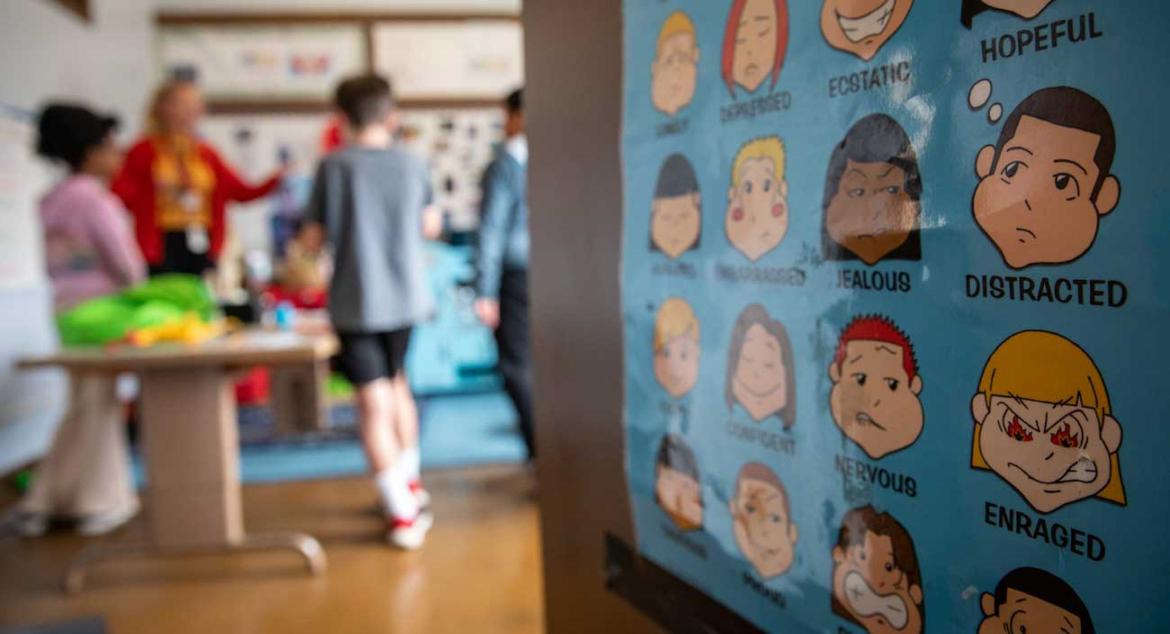
More than 40 San Francisco elementary schools, as well as 19 in Mexico, use a UCSF program that helps students with attention challenges – and guides their parents and teachers in supporting them. [Photo: Erin Lubin/UCSF]
Weekday mornings used to be exhausting for San Francisco mom Lissette as she tried to shepherd her young son Andrew out the door to school.
“He would need constant reminders to get dressed, brush his teeth, get his shoes on,” says Lissette. “At school, his teacher had to tell him over and over to focus and do his work in class.”
Andrew, who has dyslexia and ADHD, is now a fifth grader and excels at math. His mom has seen big improvements since they started participating in a UC San Francisco-created program for elementary school students with attention and behavior difficulties called Collaborative Life Skills (CLS).
School social workers, who are trained by UCSF staff, lead the CLS program that teaches students to build organizational and social skills while instructing parents and teachers how to support their child at home and in school.
“Most school counselors aren’t trained to help children with attention issues, so the help is limited to reducing a student’s workload or giving them extra time for tests,” says psychologist and UCSF Department of Psychiatry and Behavioral Sciences professor Linda Pfiffner, PhD, who created the CLS program.
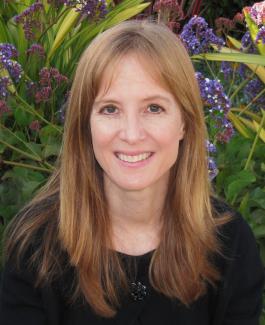
“What students need is scaffolding for all areas of their life – a plan for home and school, with specific behaviors targeted in both settings,” says CLS creator Linda Pfiffner, PhD.
CLS is an adaption of Pfiffner’s clinic-based ADHD treatment program that was requested by the San Francisco Unified School District (SFUSD) in 2009. So far, CLS has been used in more than 40 elementary schools in San Francisco, including four Spanish language schools. It also has been modified for remote, web-based training for counselors, parents and teachers and for international use, including 19 schools in Mexico.
The program has made a big difference for her whole family, says Lissette.
“Andrew is more motivated now; he sees the good outcome when he succeeds,” Lissette says. “If he is ready for school early, he gets to play with his little sister; they both love that. And I can see the change in myself – I feel confident I have the tools to really help him.”
A synergistic approach
On a sunny day in spring, four kids in the CLS group at Alvarado Elementary School stand on either side of a table, backpacks on either side. On Team One’s side, the backpacks are tidy and organized. On Team Two’s side, the bags brim messily with crumpled papers, food wrappers and loose pencils.
Social worker Jeanette Feddes, stopwatch in hand, explains the rules. Find all the objects in the backpack that are listed on your sheet of paper. The first team to get all the objects wins.
After 12 seconds, Feddes stops the watch. “Way to go, Team One!” she shouts, as the kids on the far side of the table beam with satisfaction.
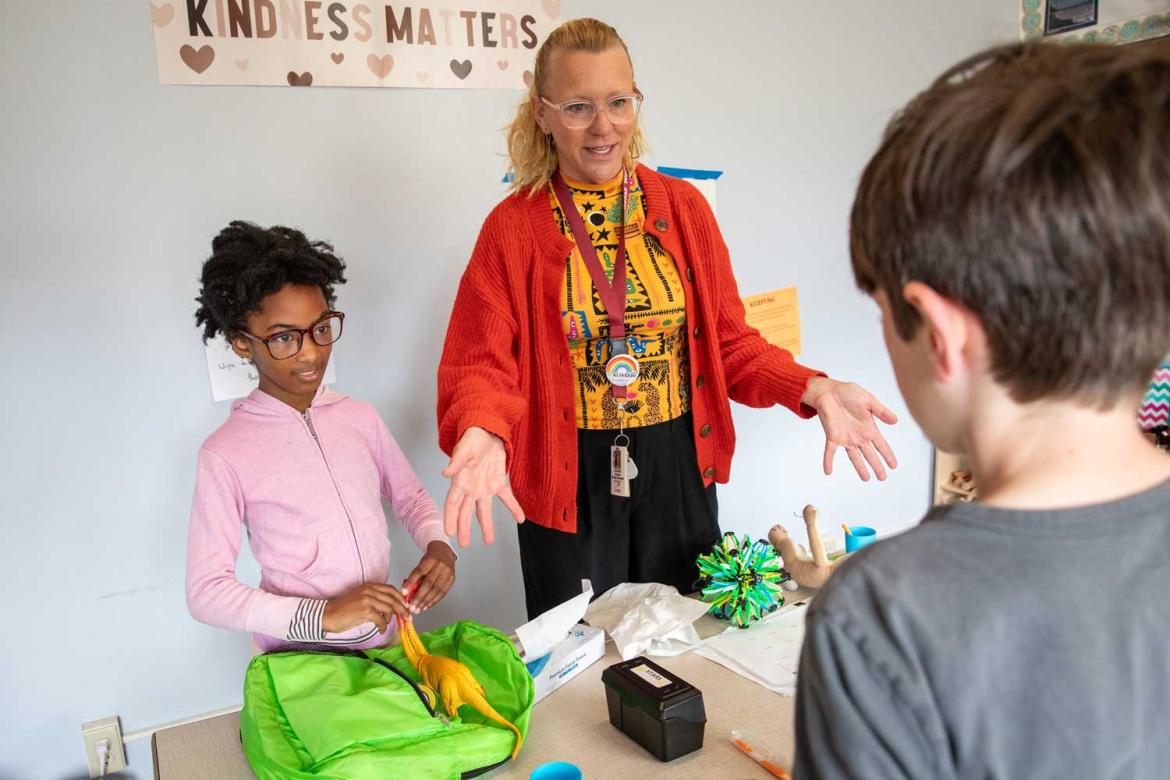
Social worker Jeanette Feddes leads a “getting ready for school exercise.” [Photo: Erin Lubin/UCSF]
“These are the kinds of hands-on activities that give the kids an ‘ah-ha’ moment,” says Feddes. “If you are messy and disorganized, it takes longer to do things and you have less time for fun. So, we teach them strategies to stay organized.”
In Feddes’ eight-week CLS group training sessions, students learn many skills that often need bolstering in kids with attention challenges, such as how to do homework, have good sportsmanship, get along with others, and control emotions and impulses.
Their parents, meanwhile, meet weekly to stay current on the students’ lessons and learn how to support their child’s emotional regulation, motivation and executive functioning – things like planning, remembering and multi-tasking. Home-based strategies include giving specific instructions, enforcing routines, and incorporating consistent praise and rewards.
“Parenting a child with attention and behavior challenges can be hard and frustrating,” says Feddes. “To learn and practice those skills with other parents who understand is powerful.”
Teachers are taught to develop and revise a daily report card that includes each CLS student’s goals, which they share with the students and parents. Together, the components are synergistic.
“An isolated school-based intervention leaves a lot out,” says Feddes. “When you get everyone together to understand the child and work as a team at home and school, you get better results and more empathy.”
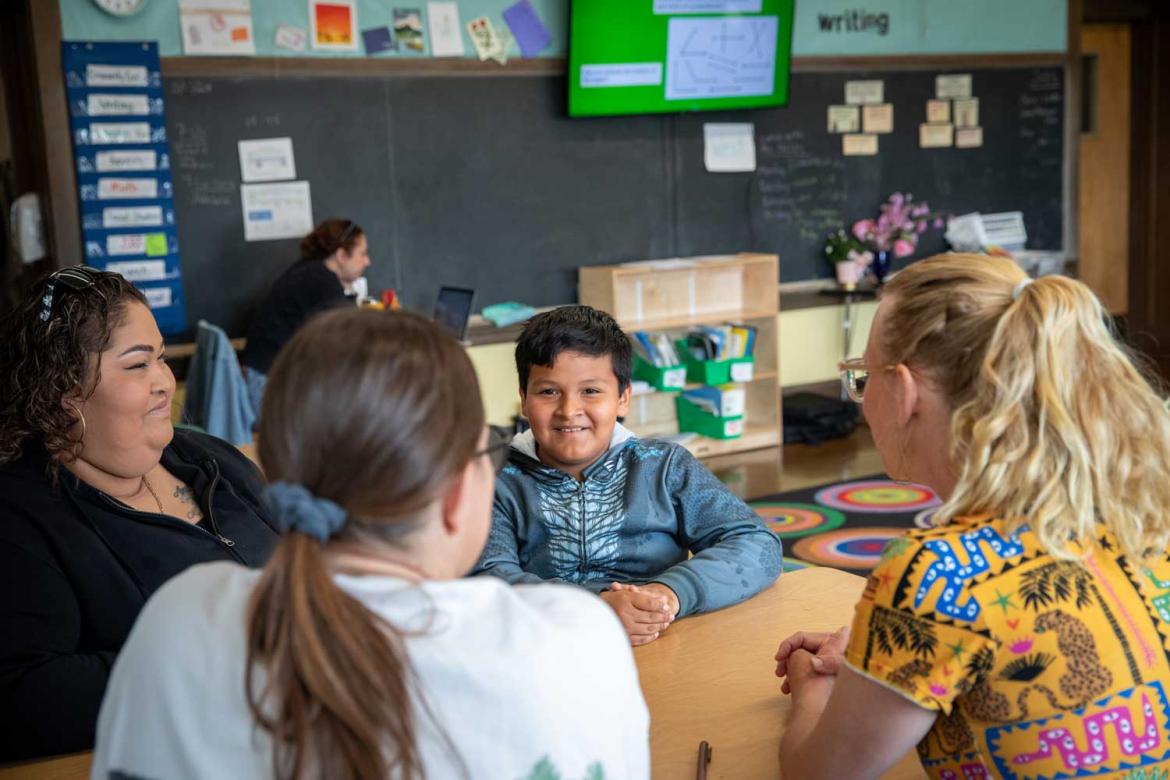
Andrew, a fifth grader who has dyslexia and ADHD, and his mother Lissette meet with Feddes and Andrew’s teacher. The CLS program also trains parents together on how to support and manage their students’ ADHD. [Photo: Erin Lubin/UCSF]
First San Francisco, then the world
Several published studies have shown that the CLS program improves students’ behavior, ADHD symptoms, and social and organizational skills – results that persist at least eight months after the program ends. These findings held true in the English and Spanish programs, in-person and online, and in internationally in Mexico.
At the same time, the studies have helped reveal specific areas for improvement. Theresa Gundran-Rosales, a social worker at Robert Louis Stevenson Elementary School in San Francisco’s Outer Sunset, has noted the changes in the CLS program of 2024 compared to 2012, when she used it at a different school.
“The program has more visual elements now; before it was more text-heavy,” Gundran-Rosales says. “There are more digital aspects, and procedures to designate backup school staff when someone is out sick. Everyone is more engaged as a result.”
As refinements in the SFUSD program continue, efforts to expand it elsewhere continue apace. San Diego schools are now implementing it, and successful results from a pilot in Culiacán, Mexico have led to interest from other cities in that country, says Lauren Haack, PhD, a UCSF psychologist and Department of Psychiatry and Behavioral Sciences faculty member who led the adaptation of the program for Mexican schools.
“We didn’t need to make a lot of cultural adaptations for students in Mexico; it translated well,” says Haack. “Our hope is this work can be useful to additional countries where ADHD isn’t commonly recognized.”
Accessibility and quality are key, agrees Pfiffner.
“Let’s make the program as good as possible, and available to as many students as possible,” says Pfiffner. “That’s the ultimate goal.”
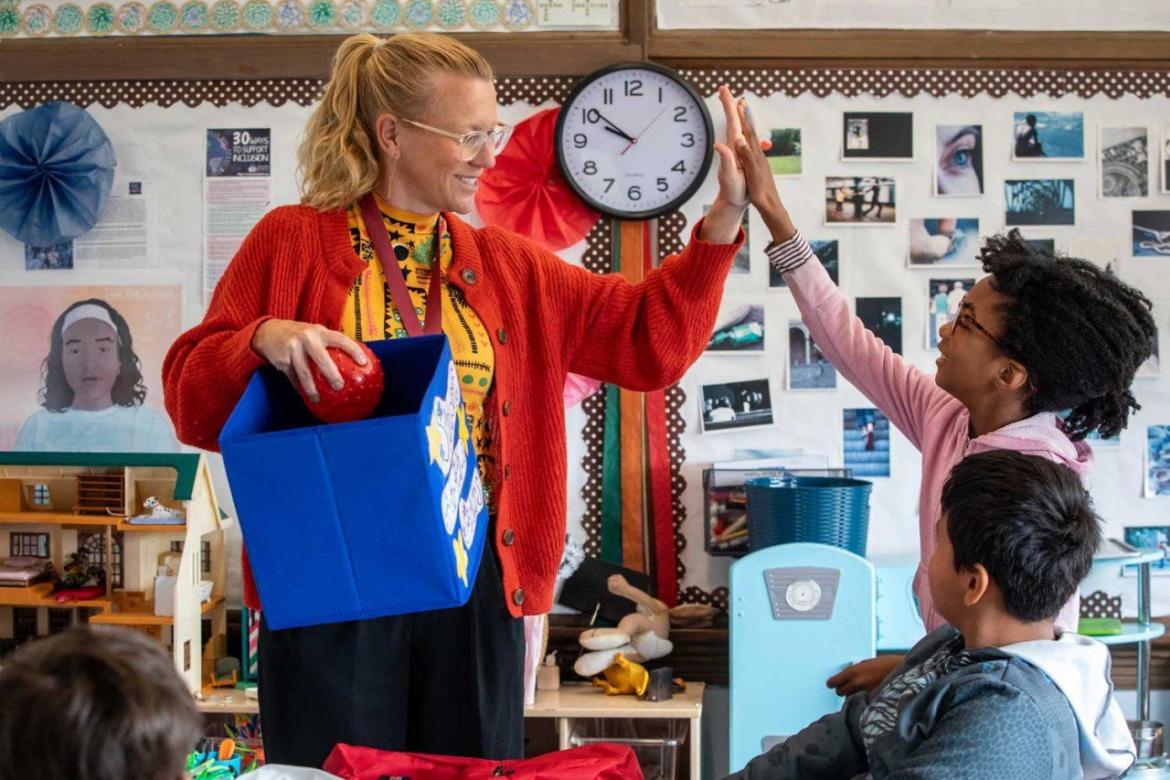
Feddes high fives 10-year-old Naomi while playing a focusing game with students who have ADHD at Alvarado Elementary School in San Francisco. [Photo: Erin Lubin/UCSF]
About UCSF Psychiatry and Behavioral Sciences
The UCSF Department of Psychiatry and Behavioral Sciences and the Langley Porter Psychiatric Institute are among the nation's foremost resources in the fields of child, adolescent, adult, and geriatric mental health. Together they constitute one of the largest departments in the UCSF School of Medicine and the UCSF Weill Institute for Neurosciences, with a mission focused on research (basic, translational, clinical), teaching, patient care, and public service.
UCSF Psychiatry and Behavioral Sciences conducts its clinical, educational, and research efforts at a variety of locations in Northern California, including the UCSF Nancy Friend Pritzker Psychiatry Building; UCSF Langley Porter Psychiatric Hospital; UCSF Medical Centers at Parnassus Heights, Mission Bay, and Mount Zion; UCSF Benioff Children’s Hospitals in San Francisco and Oakland; Zuckerberg San Francisco General Hospital and Trauma Center; the San Francisco VA Health Care System; UCSF Fresno; and numerous community-based sites around the San Francisco Bay Area.
About the UCSF Weill Institute for Neurosciences
The UCSF Weill Institute for Neurosciences, established by the extraordinary generosity of Joan and Sanford I. "Sandy" Weill, brings together world-class researchers with top-ranked physicians to solve some of the most complex challenges in the human brain.
The UCSF Weill Institute leverages UCSF’s unrivaled bench-to-bedside excellence in the neurosciences. It unites three UCSF departments—Psychiatry and Behavioral Sciences, Neurology, and Neurological Surgery—that are highly esteemed for both patient care and research, as well as the Neuroscience Graduate Program, a cross-disciplinary alliance of nearly 100 UCSF faculty members from 15 basic-science departments, as well as the UCSF Institute for Neurodegenerative Diseases, a multidisciplinary research center focused on finding effective treatments for Alzheimer’s disease, frontotemporal dementia, Parkinson’s disease, and other neurodegenerative disorders.
About UCSF
The University of California, San Francisco (UCSF) is exclusively focused on the health sciences and is dedicated to promoting health worldwide through advanced biomedical research, graduate-level education in the life sciences and health professions, and excellence in patient care. UCSF Health, which serves as UCSF’s primary academic medical center, includes top-ranked specialty hospitals and other clinical programs, and has affiliations throughout the Bay Area.





